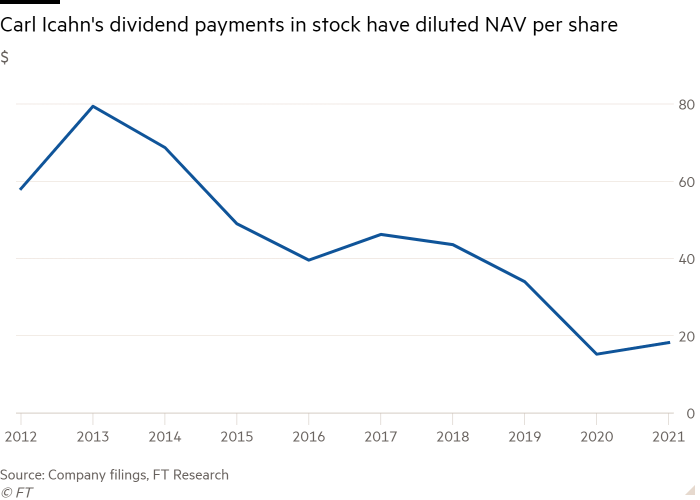
Carl Icahn, the investor who pushed to put corporate power into the hands of shareholders over the past half-century and redefine how public companies are run, seems to be embracing a softer side in the later days of his career.
An HBO documentary on his life that premiered this month portrays an outspoken multi-billionaire and fearless boardroom challenger who later finds new happiness in becoming closer to his family.
Then just this week, he was standing up for animal rights, launching a fight with McDonald’s over the way its suppliers treat pigs, his sway over one of the biggest brands in the world on full display at the age of 86.
“It sounds hokey, but I have always been upset by unnecessary cruelty,” he said in an interview with the Financial Times. “It just bothers me, especially with animals.”
He was in a reflective mood, concerned that investors no longer have the stomach to confront businesses that have failed to change their ways.
“[Shareholder] activism is declining and it’s a sad commentary that it is declining,” he said, referring to his modus operandi of building stakes in underperforming companies and rallying shareholders to agitate for change.
Icahn first came to the public eye in the 1980s. With debt from junk bond financier Michael Milken, he won control of Trans World Airlines and ruthlessly sold its assets for cash amid a fierce battle with unions. The episode earned him the title of “corporate raider” and is said to have made him one of the character sketches for Gordon Gekko in the film Wall Street.
By change in market value, his biggest impact was in demanding Apple chief executive Tim Cook implement a large dividend in 2013. Apple began paying dividends soon afterwards. Its stock has since soared by about $2tn.
Icahn has named his son Brett, who was a driving force behind successful bets on Apple and Netflix, as his eventual successor. The work of his daughter, Michelle, at the Humane Society drew him to the animal welfare issue at McDonald’s. She also helps manage his Twitter profile and it was her idea to send a tweet announcing he had built a stake in Apple, which sent shares soaring.
Over the years, his raider identity has been rebranded as the softer “activist investor”, while the prodding of mismanaged companies has gone mainstream and a growing group of activists reshaped corporations from Home Depot to Canadian Pacific Railways, eBay and DuPont.
But Icahn worries that the number of investors with the stomach or capital to pull off coups of this sort is thinning. “We don’t have a corporate democracy in this country. We have a corporate dictatorship,” he said. “There are so many unproductive companies in this country. It’s one of the causes of inflation. We don’t make enough goods.”
He also expresses disappointment in the performance of Icahn Enterprises, the publicly traded holding company he controls, which houses the bulk of his $16bn fortune, as estimated by Forbes.
Although the HBO documentary paints a picture of stellar returns, the reality is different. The company revealed this week that it lost money in 2021, including $1.3bn in bets against the market, extending an eight-year stretch when it has lost billions of dollars.
Its share price has fallen about 50 per cent since the beginning of 2014, while the S&P 500 has more than doubled.
The losses stem from costly hedges that bet against a fast-rising S&P 500, and large investments in companies such as Hertz and Chesapeake Energy, which went bankrupt.
“I don’t like to be at the mercy of the market,” said Icahn. “[We] haven’t done well the last few years mainly because I like to keep [my portfolio] hedged . . . Some of these tech stocks are insanely priced. That’s what hurt us.”
The picture may be worse than he admits. The per-share net value of assets inside Icahn Enterprises has plunged by two-thirds, from $58 to $18.2, since the end of 2013, according to FT calculations.
The major factor is the company’s practice of paying a staggering $8 a share annual dividend.
Icahn, who owns about 90 per cent of the shares, takes this dividend in stock instead of cash almost every year. As a result, shares outstanding have almost tripled since 2012. But Icahn Enterprises’ net assets have not grown in tandem, meaning the per-share value has fallen sharply.

Icahn said he was not concerned by the dilution because he maintained a large reserve of cash and would wait for markets to turn back in his favour. “I like to use the cash to be my army.”
The outlook may be brightening as tech valuations have fallen and the market has been rattled by the prospect of rising interest rates. “The last two months have been pretty good for us,” he said.
Investments in energy companies such as Occidental Petroleum and liquefied natural gas export terminal operator Cheniere may benefit from soaring energy prices.
Before he finishes, Icahn took the time to point out a winning trade from an otherwise mediocre year.
He bet against video game retailer GameStop at the height of the meme stock bubble in early 2021. “We shorted right at the very top and made a lot,” he grinned.
Then he quickly offered a caveat: “We got very lucky . . . I’ve learned the hard way, you can’t pick when a bubble bursts.”
Stay connected with us on social media platform for instant update click here to join our Twitter, & Facebook
We are now on Telegram. Click here to join our channel (@TechiUpdate) and stay updated with the latest Technology headlines.
For all the latest Business News Click Here
For the latest news and updates, follow us on Google News.
